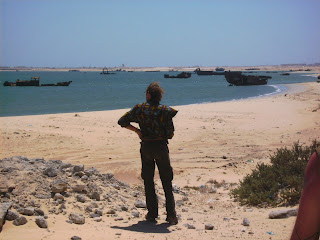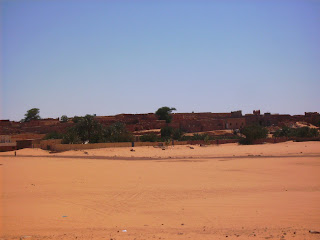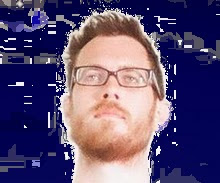
So, I'd been in Morocco for about a year and a half, and though I had been able to travel up to Spain and Portugal a number of times, I'd been frustratedly unable to visit any other African country because A) inter-African flights are super expensive, and B) the border between Morocco and Algeria is definitively closed. In mid-March, I had a couple of weeks free, so I headed south toward Mauritania. The goals were 3-fold. First, I wanted to hitchhike the Mauritanian Sahara, the so-called Land of 1000000 Poets. Second, I wanted to hear and share some music, playing my half-earnest role as the musical ambassador from the United Frontierless States of Humanity. Third, I wanted to get to Chinguetti, the fabled desert-town of scholars and sages, the ancient "Library of the Sahara."
Because I only had 2 or 3 weeks, I started out with a 26- or 27-hour bus ride from Marrakesh to Dakhla way down in the Western Sahara. I arrived as the sun was sinking kind of low, so I immediately hitchhiked out of town, arriving near the main road toward Mauritania right after nightfall. Walking out into the desert to find a place to sleep, I was worried both about landmines and the rumored cold of the desert night. I like to travel without a tent (for a bunch of reasons) and it was already getting really windy, so I found a semi-sheltering mound right next to a path (less chance of landmines) and hunkered down for the night. It did get really windy, but not as cold as I'd feared, and wedged up against this mound with my guitar case sheltering me, the wind wasn't so bad... I took this picture at dawn, feeling good.

Then I ate some breakfast, and took a picture of my still sleepy-eyed self once I got to the road.

Walking along the road for a bit, I found this sign:

Nouadhibou 389 km down yon road, Nouakchott 904. Dakar, in Senegal, was 1430 km. I hadn't ruled out the possibility of slipping into Senegal if time permitted, so it was smile-invoking to see these 3 countries all represented on this one sign. A good-omened place to wait for a ride. While I was waiting there, I met another hitchhiker, Tawfaq, a guy who, though only 28, said he'd been traveling for the last 10 years. He was from Casablanca, so leaving the country was harder for him than for me, and he was only planning on going south to Lagueera, on the Moroccan side of the border. We agreed on the injustice in the fact that it was easy for me to get into his country, and near impossible for him to get into mine. He seemed to get a big laugh out of speaking classical Arabic with me, and though he spoke well, it seemed like to do so he was forced to dig deep into recesses of dusty memories. Once I tried to switch into French and he insisted, No, keep on speaking Arabic. It was still pretty early in the morning, and no cars were going by, so after a while I pulled out out my guitar and played some Moroccan music for him, and then some old American folk songs. He clapped and sang. As I was playing, a truck stopped to pick one of us up. I'd been at the spot first, so Tawfaq and I exchanged Tariq Salama's (ie 'peaceful road') and I rolled away with Hussein, a Marrakshi who'd been living in the Western Sahara for a long time. I wonder if he'd moved there along with the droves of others in the 1970's, when Morocco was trying to assert ownership of the Western Sahara by simply building up cities there and populating them with the overflow from the big cities up north. Hussein was apparently making morning bread deliveries, so his truck was filled with lots of round loaves of bread, as well as batteries, condensed milk, bottles of water, and other supplies. He tells me that being a "mutajawwil", ie. roamer, traveller, is a good thing. He also warns me about landmines. I ask him with feigned earnestness where the POLISARIO is, and he points into the desert, shining with an almost-smile. He wants to know if there are deserts in America, and if there are many Muslims there. We pass a sign pointing toward a fishing village called "Porto Rico" and I tell him about the island in the Caribbean of the same name. "Istaaamar," or colonization, is something we both understand without having to talk about it much... He makes a stop at a gas station to drop off some bread, and tells me this is the best place for me to look for a longer ride. I fill up my water bottles, drink a pot of tea, then leave the gas station and wait here:

This (now illegible) sign is supposed to bear warning about the fact that the Western Sahara has a lot of landmines in it. They were put there mostly by the POLISARIO, the group that's been fighting for the last 30 or 40 years for the autodetermination and independence of the Western Sahara. Morocco claims that the Western Sahara is theirs, and almost all western-aligned countries support them in this claim. Non-aligned countries and others tend to support the POLISARIO. Morocco currently claims full sovereignty over the lands, and for the last 10 or 15 years the battling has pretty much subsided. The POLISARIO never really gave up, though, they've just kind of retreated into the desert... (Gets one to thinking about the mountains of Afghanistan, doesn't it?) The landmines they planted are still there, though, so you have to stick close to roads along the hundreds and hundreds of kilometers of Western Sahara. And if there is lots of oil here, like everybody says, it seems that these manifold landmines are doing a pretty good job of keeping it there. Maybe it'll be the only petroleum left, some day...
It didn't take too long to get a ride. Less than an hour later, I was en route over the border in a 2-car caravan with a Belgian guy named Chris his friend Patrick, a Frenchman. They said they were probably roadtripping to Mali. I rode shotgun in Chris's big flatbed truck, and Patrick flew on ahead in a beat-up old red French sportscar.
Chris was a (very) big guy with a vice-grip handshake who exuded authority and calm strength. He was a pretty awesome friend to have during the slightly intimidating border crossing. He told me lots of stories. It seemed like he'd been everywhere: North and South America, Asia, all over Europe and Africa, everywhere. He'd once lived on an island off the coast of Mexico. He had been very rich, he told me, and he had been very poor. When he was rich, it seems that his favorite hobby had been to buy big old army trucks and drive them through deserts all over the world. He told me stories about Syria, Jordan, lots of different places in Africa. One time, he'd taken a group of Belgian "juvenile delinquents" (he searched for the word in English and was happy to hear it when I came up with it) on a trip through Algeria, on a project to expose these wayward urban youth to the greater world in a way so as to shock and awe them uprightness. He'd also known a man who had gotten blown up by a landmine here while sauntering away from the road to take a piss. The route we were currently on was old hat: he'd driven through the Western Sahara a couple of times back in the early '90's, back when there was no paved road and you had to go with a fully armed military convoy because an attack from POLISARIO was a very real danger. At one point, he told me, you used to have to go down to the beach and drive there because there were too many landmines everywhere else. But you had to play the tides right. If not, they would come in and the sea would swallow up your car.

As we rode, the sands changed several times. It seemed like there were many deserts, and we were passing from one to the other. In these pictures, notice the big dunes behind the rocky scrub of the foreground.


And finally we reached the border. I didn't take any pictures there because I heard they'll confiscate your camera at the drop of a hat. In between the Moroccan and the Mauritanian gates, however, there are 5 or 7 kilometers of No-Man's-Land. This, for the most part, is filled with stripped and abandoned cars, as the following pictures show.



The No-Man's-Land is an eery place. There's no easy road, and we had to dig the cars out of the sand a number of times. And men run up to you at intervals offering to buy your car. It seems that many Europeans regularly drive suspiciously acquired vehicles down here to sell them to men who will launder them and re-sell them. There are credible stories that behind the hills of the No-Man's-Land, there are rows of cars being guarded by heavily armed groups of men.
At the Mauritanian border, there are three men working. Two of them are in an office, working with visas. The third goes out to the vehicles, looks around, and asks you for a present. The cars in front of us siphoned out some gallons of gasoline to give to the man, or they gave him a carton of (contraband) cigarettes, and in one instance the man walked away with a bright yellow 1970's Italian-style television set. Belgian Chris shook the man's hand very firmly, and didn't let go. Then, he insisted that he had nothing to give. It took 10 minutes to convince the man that this was the case. Finally, the man asked for a pen, and Chris pulled one out of a knapsack, and handed it to him. Then we drove into Mauritania.

A few miles into the country, I accidentally took a picture of the above character, a guy with long blond hair carrying a guitar in his hand. Perhaps he was the former Frontierless Ambassador of Music, and I was there to replace him.

The sun set on the dunes as we drove to Nouadhibou.
In the dark, we passed the beginning of the bay Nouadhibou was built on. It was the French who built most of it up, it was originally called St. Etienne.

We stayed at an Auberge in Nouadhibou that night, and the 3 or 4 guys who worked there (or just hung out there?) really liked the music that came out of my guitar. They also liked to bang at it themselves, of course. Then they would ask me if they were good guitar players. I pointed at their right hands, the one that beat out the rhythm, and said, "Yeah, that hand is really good." Then I pointed at their left hand, the one that should have been finding melodies to be made. "That hand, not so good." They laughed a lot.
Chris wearing his Peruvian Poncho, and Daoud playing my guitar:

The next day, Chris and Patrick drove me around Nouadhibou a little. I hate taking pictures while I'm walking with a rucksack, it makes me feel sick inside, so I took the opportunity to snap some "urban Mauritania" pictures from inside Chris's car.
A hill covered with abandoned washing machines (why? were they unable to repair them when they broke? did they use to0 much water? why?) :
.jpg)
A far-off minaret and men pushing a car:

One of the poorer neighborhoods:

Baghdad this way, Dubai that way:

I'm guessing these are the names of neighborhoods. Iraq and UAE are kinda far away.

Sand covers half of the paved roads.

They took me to the harbor, where there are at least 9 abandoned boats rotting away there.

Patrick looked pensive. And then he broke into his wry, cynical smile. I think he might have even winked at me.

Patrick was an interesting cat. He'd lived in Burkina Faso for at least a few years, and I got the impression that he was thinking about returning there after the (maybe) trip to Mali. He showed me some pictures of Burkina. The house that he'd made himself:

A baobab tree:

How many chickens do you think this man is carrying???:

At the border, they'd only given me a 3-day visa, despite my various supplications and protests. (Very good supplications and protests in my best French, if I do say so myself. But to no avail.) It was the policy with all Americans, they told me. Thus, I was required to report to the southern capital city of Nouakchott, within 3 days, in order to extend my visa. I was upset because that disrupted my plan to head directly east to Chinguetti, afterwards working my way south. This was the only way I figured I had a chance of making it to Senegal... But there was no remedy: I had to head south ASAP. As Chris and Patrick were headed that way, they asked me if I wanted to tag along. They were good company, so I didn't see any reason why not.
On the sand-blown road to Nouakchott:

It took me two days in Nouakchott to get the visa. This is the only picture that I took while I was there:

This was the inside of of the roof of the big tent ("khaima") in the auberge I stayed in while in Nouakchott.
In a sense, I didn't take any pictures of Nouakchott because the whole city was a picture. There was no way I could have chosen one thing to shoot, for I would have had to simply walk around taking pictures of everything. But beyond that, I didn't take any pictures because it felt wrong. One of the days I was there, I carried my camera in my front pocket intending to do some photography, and the entire day I felt compelled to simply let it sleep there. There is something demeaning about taking photographs of poverty. Especially seeing as I had no productive purpose in mind for the photographs. So there are no photographs of Nouakchott.
I plan on finishing recountin' in the coming days. Check back later for further stories and explanations to go with the following photos.
















































